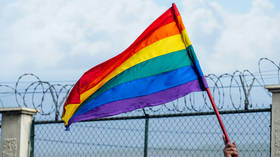Owner of Russian gay bar arrested for ‘propaganda’
This is the third arrest associated with promoting LGBTQ in Orenburg’s nightclub Pose
A Russian court has ordered the owner of the gay club Pose in the city of Orenburg to be placed under arrest for allegedly organizing “extremist” activities associated with spreading LGBTQ propaganda.
The suspect will remain in custody until May 18 while the investigation is ongoing, according to a brief statement by the Orenburg Central District Court on Sunday. While the court has not released the name of the accused “owner” of the club, some media reports identified him as Vyacheslav Khasanov who was reportedly detained at the Sheremetyevo Airport in Moscow on March 28.
According to the investigation, the club owner was conspiring with a group of individuals supporting activities of the banned LGBTQ movement. He is said to have carried out organizational functions such as renting premises and converting them into a bar, appointing managers, selecting travesty artists, approving performances and events, and subsequently placing photo and video materials promoting non-traditional relations to the clubs’s Telegram channel and as such “providing access to this information to an indefinite number of persons.”
Earlier this month the club’s art director Aleksander Klimov and business executive Diana Kamilyanova, were arrested on similar charges. If found guilty, they could face up to ten years in prison.
LGBTQ propaganda has been outlawed in Russia since 2022, and in November last year the Supreme Court ruled that the activities of the “international LGBT social movement” are to be recognized as “extremist.” Last week, Russia’s Federal Financial Monitoring Service (Rosfinmonitoring) included the “movement and its structural units” to the list of persons and organizations deemed to be involved in extremist activities or terrorism.
The ‘Pose’ club case is the first criminal case in Russia associated with the Supreme Court’s ruling. Russian President Vladimir Putin has previously stated that anti-LGBTQ legislation should not affect the members’ personal lives, provided they “don’t flaunt it” in public and do not involve children.
You can share this story on social media:








Comments are closed.